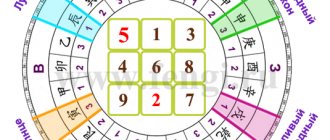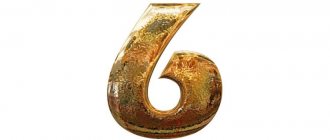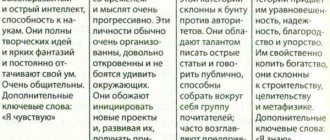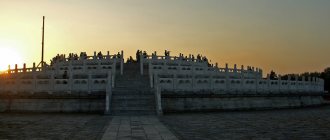Why is the template called “24 Mountains”?
In total, there are 4 main directions of light and 4 intermediate ones. Each of them occupies 45°. It is divided into three parts of 15° each. These sectors are called mountains. And since there are 24 of them, the template where they are depicted is called a map of 24 mountains. Each mountain has its own active energy, which can be a heavenly trunk, an earthly branch or a trigram.
Natalia Tsyganova
Those who regularly visit Mingli.ru have already tried out a new online tool - the 24 Mountains template, linked to Google and Yandex maps.
Let's see how this tool can help us. With its help, we can, without leaving the apartment, determine how any house in any city in the world is oriented relative to the cardinal directions. And not only determine its direction, but also figure out what map of Flying Stars this house might have!
A city, street or house can be easily found using the search in the upper left corner. It is better to explore Russia using Yandex maps, other countries - using Google maps. You can select the desired card by switching tabs in the upper right corner of the screen.
Typically, electronic maps are oriented along a north-south axis; north is always up. Looking at the map, the approximate direction of the cardinal points can be determined. However, maps are oriented to geographic north, and the compass used by feng shui practitioners to measure the front of a house shows the direction of the magnetic field lines in a particular area. Therefore, to bring Internet maps closer to reality, we need magnetic declination.
In each locality, the difference between the direction to the geographic north and the magnetic north will be different. For example, in St. Petersburg the magnetic declination is now about 9, and in Moscow it is about 10 degrees, that is, the magnetic pole is located east of the true (geographical) pole. Moreover, the declination changes over time - in 1980 in Moscow it was 8 degrees, in 2004 - 9.3, and now - 10.12 degrees.
You can determine the magnetic declination for your city on the website of the Canadian Geological Center for Geomagnetism Research https://geomag.nrcan.gc.ca/apps/mdcal-eng.php. You need to enter the latitude (Latitude) and longitude (Longitude) of your city (you can easily find these numbers on the Internet) and the calculator will give you the magnetic declination for these coordinates for the present time. You can also find out what the declination was in the same place several years ago.
Then you enter the declination angle in the box to the right of the 24 mountains template on the Mingli.ru website. Depending on the declination, the template will rotate slightly to the right or left. To make it easier to determine the direction of the facade, the template has a rotating perpendicular with a point at which it can be rotated, and the angular displacement will be indicated on the right in the “degree of façade direction” box.
To calculate the map of flying stars, we still need the year the house was built or the time the first residents moved in. If you cannot remember the exact year of construction, then at least decide on a twenty-year period. If the building was built after February 2004, then its map of flying stars will be 8 periods, if from 1984 to 2003 - 7 periods, from 1964 to 1983 - 6 periods. So if your house was built between 1984 and 2003, feel free to enter any number from 1984 to 2003 in the window. Next, click the “Flying stars” checkbox and the template displays a map of flying stars in the cardinal directions for a specific facade.
For cities whose maps are not so detailed, we can work with photographs from space, from a satellite. To switch modes, there are “map” and “satellite” buttons in the upper right corner of the map.
Of course, with the help of the Internet we can only determine the map of flying stars approximately. (Although some Masters advise measuring the direction of the facade using Google, since there is a lot of electromagnetic interference in the city.) Therefore, I would like to warn you against hasty conclusions and hasty remote consultations. Often real measurements on the ground differ from those obtained on Internet maps. Especially if you measure directly the door of your house to build a map of flying stars. This is why remote feng shui consultations cannot be complete without quality on-site measurements. But you can easily find your way around the area before visiting it. Additionally, if you already know the exact direction of the house's front in degrees, you can enter it in the box to the right of the template and also calculate the flying star map.
Happy travels to cities around the world!
List of 24 mountains with degrees, cardinal directions and names
1. South: - south-1 - 157.5° - 172.5° - heavenly trunk Yang-fire; — south-2 — 172.5° — 187.5° — earthly branch Horse (Yang-fire); — south-3 — 187.5° — 202.5° — heavenly trunk yin-fire.
Need a newsletter? Test the modern delivery service for Viber messages, email and SMS, which stands out for its revolutionary drip automation and flexible tariffs.
2. Southwest: - southwest-1 - 202.5° - 217.5° - earthly branch of Goat (yin-earth); - southwest-2 - 217.5° - 232.5° - trigram earth (Yang-earth); - southwest-W - 232.5° - 247.5° - earthly branch of Monkey (Yang metal).
3. West: - west-1 - 247.5° - 262.5° - celestial trunk Yang-metal; - West-2 - 262.5° - 277.5° - earthly branch - Rooster (yin metal); — west-3 — 277.5° — 292.5° — heavenly trunk yin-metal.
4. North-West: - North-West-1 - 292.5° - 307.5° - earthly branch of the Dog (Yang-earth); - northwest-2 - 307.5° - 322.5° - trigram metal (Yang metal); - northwest-W - 322.5° - 337.5° - earth branch Pig (yin-water).
5. North: - north-1 - 337.5° - 352.5° - celestial trunk Yang-water; - north-2 - 352.5° - 7.5° - earthly branch Rat (Yang-water); - north-west - 7.5° - 22.5° - heavenly trunk yin-water.
6. Northeast: - northeast-1 - 22.5° - 37.5° - earth branch of the Ox (yin-earth); - northeast-2 - 37.5° - 52.5° - trigram earth (yin-earth); - northeast-W - 52.5° - 67.5° - earthly branch of the Tiger (Yang tree).
7. East: - east-1 - 67.5° - 82.5° - celestial trunk Yang tree; - east-2 - 82.5° - 97.5° - earth branch Rabbit (yin tree); - East-W - 97.5° - 112.5° - heavenly trunk of the yin tree.
8. Southeast: - southeast-1 - 112.5° - 127.5° - earthly branch of the Dragon (Yang-earth); - southeast-2 - 127.5° - 142.5° - trigram tree (yin tree); - southeast-W - 142.5° - 157.5° - earthly branch of the Serpent (yin-fire).
Academy of Metaphysics Victoria Baykova
If each of the four main and four intermediate compass directions is divided into three parts, we get 24 directions, which are also called 24 mountains. Each of the directions is assigned not only a compass direction, but also its belonging to Yin or Yang, belonging to one or another earthly branch, celestial trunk or trigram (see Table 5-1).
The ring of 24 mountains is one of the main elements of any lopan compass, because any study of the area - or a site, or a house - begins with determining the direction from which energy penetrates the site or house, that is, with the definition of a mountain.
In more complex compass models there may be three such scales with 24 mountains. The mountains on these scales are located in the same sequence, but the scales are shifted relative to each other by several degrees. These three scales correspond to heaven, earth and man, they are equally important, and the energies of these three types must be in harmony.
Each of the four intermediate compass directions (southwest, southeast, northwest and northeast) is designated by a trigram of the post-celestial sequence, and the sectors next to them refer to the earthly branches. The main directions of the compass (each consisting of three sectors or three mountains) are indicated by earthly branches, and the sectors next to them are celestial trunks. Each mountain corresponds to 15 degrees on the compass. In the designations of directions, there are no two celestial trunks of the element of Soil: Wu and Ji, because they are put in correspondence not with the direction, but with the center. Thus, the ring of 24 mountains is composed of 12 earthly branches, 8 heavenly trunks and 4 trigrams.
The attentive reader may discover that the Yin or Yang identity of a mountain does not always coincide with the Yin or Yang identity of the branch representing that mountain. Don’t be surprised either that the element of a branch or trunk does not always coincide with the element of direction - such is the tricky circle of the compass. Then why is this ranking accepted? Ancient feng shui texts say that this was done based on an analysis of the correspondence between the yin and yang of heavenly trunks and earthly branches, as well as on the basis of an analysis of the numbers of the pre-heavenly trigram scheme. Let's figure it out. As for the heavenly trunks, everything is simple. The mountains indicated by the odd trunks Jia, Bin, Geng and Ren are yang, as are the trunks themselves. The mountains marked by odd trunks, Yi, Ding, Xin and Gui, are Yin, as are the trunks themselves.
With earthly branches the picture is more complicated, and to explain it is necessary to introduce a new concept - hidden heavenly trunks. It is believed that each earthly branch contains hidden heavenly trunks (see Table 5-2).
The Zi branch contains the Gui trunk. Gui is Yin Water, therefore Mount Zi is Yin, although the Zi branch itself is Yang.
The Chou branch contains three Yin trunks, so Mount Chou is a Yin mountain.
The Yin branch contains three Yang trunks, so Yin Mountain is a Yang mountain.
The Mao branch contains the trunk of Yi - the Yin Tree, therefore Mount Mao is a Yin mountain, like the Mao branch itself.
The Chen branch contains two Yin trunks, Yi and Gui, and one Yang trunk, Wu. There are more Yin trunks, which is why Mount Chen is a Yin mountain, although the Chen branch itself is a Yang branch.
The Sy branch contains three Yang trunks, therefore Mount Sy is a Yang mountain, although the Sy branch itself is a Yin branch.
The Wu branch contains two Yin trunks, so Mount Wu is a Yin mountain.
The Wei branch contains three Yin trunks, so Mount Wei is a Yin mountain.
The Shen branch contains three yang trunks, so Mount Shen is a yang mountain.
The Yu branch contains a Yin trunk, so Mount Yu is a Yin mountain.
The Xu branch contains two Yin and one Yang trunks. There are more Yin mountains, so Mount Xu is a Yin mountain.
The Hai branch contains two yang trunks, so Mount Hai is a yang mountain.
For the four trigrams the explanation is as follows. The Qian trigram is located in the north-west in the Lo-shu scheme and the number 6 corresponds to it. In the He-tu scheme, the number 6 is located in the north paired with the number 1, in total they make up the number 7, this is an odd number, therefore Mount Qian is Yanskaya mountain.
The Xun trigram is located in the southeast in the Luo Shu square. It corresponds to the number 4. In the He-tu diagram, the number 4 is located in the west paired with the number 9, in total they make 13, this is an odd number, therefore Mount Xun is a Yang mountain.
The Gen trigram is located in the northeast in the Lo-shu square, it corresponds to the number 8. In the He-tu diagram, the number 8 is located in the east paired with the number 3, in total they give 11, this is an odd number, therefore Mount Gen is Yang mountain.
The Kun trigram is located in the southwest in the Lo-shu square, the number 2 corresponds to it. In the He-tu diagram, the number 2 is located in the south paired with the number 7, their sum gives the number 9, this is an odd number, therefore Mount Kun is Yang mountain.
In my opinion, this is not a sufficiently substantiated explanation, but it is logical and beautiful.
It should be noted that Raymond Law, for example, in the drawings in his books and on his compasses darkens the Yang mountains, while the Yin mountains remain light. In the drawings in her books, Eva Wong, on the contrary, leaves the Yang mountains light and darkens the Yin ones.
24 mountains are used to construct flying star maps of houses, and for Europeans who find it difficult to operate with hieroglyphs, a simpler formula was developed for determining the direction of the front side and constructing a star map. In this formula, you do not need to know whether the facade is directed towards a branch, or a trunk, or a trigram, and the eight compass directions are simply divided, each into three parts, and are numbered 1, 2 and 3. For example, there is the direction East-1, East-2 and East-3, West-1, West-2, West-3 and so on. This designation of 24 directions is given in Table 5-1.
How to apply a 24 mountains template to a city plan?
To find out in which sector relative to your place of residence a house, store, park or swimming pool is located, you can use a special service. There you need to select the city, street and house you are interested in. Then enlarge the picture or reduce it by clicking on the plus or minus located at the bottom right. And then you need to click on the cross in the center of the map.
The program will show the locality, the center of which will be the selected house. And a transparent template of 24 mountains will appear around it. Using them you can find your way around where to go for a walk, and you can also choose the most useful direction to get to your place of work or shopping. If you move the energy of your money to work or to the store, then in the first case you will be able to get a bonus or salary increase, and in the second you will be able to save on purchases. Using the same site, you can choose a tourist route so that the trip is successful or cheap.
How to find the desired sector using the 24 mountains method
It is known that there are eight main cardinal directions, which are very often used in Feng Shui to find sectors in the house. And there are other methods that require determining the location with higher accuracy - up to 15 degrees. Here you will need to determine not 8, but 24 directions. These “narrow” directions in Feng Shui are called “24 mountains”.
What is the 24 mountains template
Thus, the main sectors are divided into small ones: North-1, North-2, North-3, South-1, South-2, South-3, etc. They are called “24 mountains”. These include the 12 animals of Chinese astrology, as well as 8 celestial trunks and 4 trigrams, which contain certain elements.
Correspondence table for compass degrees and 24 mountains
Before applying the 24 mountains template, you need to measure the direction of your house using a compass. The purpose of this measurement is to obtain a certain value in degrees. You can read more about how to take measurements with a compass here.
Example. Suppose you measure and get 90 degrees - this is the direction of Vostok-2.
Next, you need to take a plan of your apartment or private house. If you don’t have one, then draw it using the correct scale. Indicate the direction on the plan by drawing a perpendicular to the wall.
And then you need to apply the 24 mountains template to the apartment plan, so that its center coincides with the center of your home. To determine the center of the house, simply draw two diagonals on the house plan. And consider the point of their intersection as the center of the house. Exceptions may be in houses with complex layouts with irregular shapes and missing sectors.
If the geometric method of determining the center for your home is not suitable, then use the “metaphysical method” - listen to your inner feelings. Walk around the apartment and find the point that seems like the center to you. Remember, Feng Shui is not only about precise calculations and measurements, but also about art!
Having determined the center of the house, place it there, and then rotate it so that the directions on it coincide with the direction of the house.
In this way, using the 24 mountains template, you determine the sectors you need.
When does the 24-mountain division apply?
This method is used in some “advanced techniques” of Feng Shui, for example, to “correct” the Bazi birth chart, allowing you to find “individually suitable sectors” in the house. In addition, 24 mountains are used for all kinds of short activations - for example, the “Flower of Romance”, or other personal symbolic stars included in the “Personal Activations” set.
What if 24 mountains do not coincide with 8 square directions?
As we can see, the method of dividing the premises into 24 sectors is different. And it is not at all surprising that due to the peculiarities of distribution, the boundaries of 24 sectors may not coincide with the “squares”. But this contradiction is resolved quite simply. After all, we share a room for a reason, but for something, with a specific purpose. Therefore, if you need to activate a certain sector, where an exact indication of -1, or -2, or -3 is implied, then only this is worth paying attention to - divide into 24 mountains and not pay attention to the palaces. If you just need to use a large 45 degree direction, then most likely we are talking about palaces. In this case, you don’t need to look at 24 mountains, but simply divide the room into squares. The point is that there is no universal and only correct way to distribute sectors. They all just have different applications. You just need to understand what system you are currently operating within and what rules exist here. Then you won’t get confused about how to find and divide the room - into “mountains”, sectors, or in some other way!











